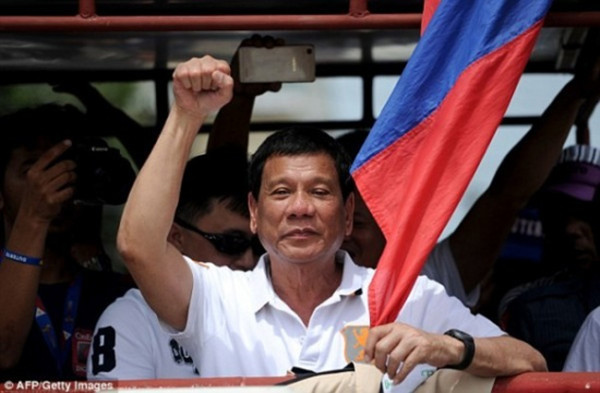By Tom McGregor, CNTV commentator
When Benigno Aquino served as President of the Philippines, the administration had drawn closer to Washington, supporting United States President Barack Obama’s ‘Pivot to Asia’ strategy to establish a stronger presence in the continent.

Roderigo Duterte
Beijing-Manila relations turned frosty when Aquino filed a case in 2013 with a so-called United Nations-backed tribunal to rule on disputed territorial waters in the South China Sea. Japanese-born Judge Shunji Yanai, with close ties to Japan’s Prime Minister Shinzo Abe, had issued a favorable decision for Manila last July.
Roderigo Duterte, who entered Malacanang (presidential palace), on June 30 had campaigned to crackdown on crime and to improve relations with China. The South China Sea judgment had placed him in a precarious position, but he said Manila should seek consensus with China on the issue.
He’s moving forward on the pledge, since he’s scheduled to visit China on Oct. 18-21.
Building better biz deals
The state visit will be Duterte’s first trip outside of Southeast Asia, since assuming office. He anticipates to sign major economic cooperation - trade, investment and infrastructure - deals.
“China has repeatedly invited me,” Today news website quotes Duterte as saying at Malacanang earlier last week. “I have accepted the offer.”
Beijing officials have expressed warmth. “The clouds are fading away,” Chinese Ambassador to Manila Zhuo Jianhua said. “The sun is rising over the horizon and will shine beautifully on the new chapter of bilateral relations.”
Manila will bring along a large business delegation. The Philippines had signed up as one of the founding members of the China-led Asian Infrastructure Investment Bank (AIIB) last year. The AIIB acts as the finance mechanism to fund major infrastructure projects, via China’s Belt & Road Initiative.
Belt & Road consensus
Chinese President Xi Jinping introduced the Belt & Road Initiative in 2013 with plans to build more infrastructure for nations in Asia, Africa, the Middle East and Europe. The emerging markets can work with Beijing to construct major logistics, energy and manufacturing hubs that boost cross-border trade and investment.
Manila expects to discuss the Belt and Road on Duterte’s trip.
“Our expectations are that the doors will be more open for trading relations with China, and for other opportunities from which we can benefit from China” Philippines Communications Secretary Martin Andanar told Business Mirror.
He added, “There are many opportunities, such as infrastructure projects and railways projects, which they can do and provide as help to our country.”
Beijing has demonstrated goodwill by recently lifting import restrictions on imports of bananas and pineapples from the Philippines. The AIIB could provide soft loans for future infrastructure projects in the country.
Common ground on South China Sea
The most thorny topic facing bilateral relations has been territorial disputes in the South China Sea. Both sides are laying historical claims over islets and boundaries, but they will engage in two-way talks to search for common ground.
When Duterte joins the negotiations table in China this week, he said he would make a request from Beijing to allow permission for Filipino fisherman to sail into disputed waters.
This seems like a fair request and Manila hinted they will discuss the South China Sea in a reasonable manner.
“It’s time to lower the tensions. You know the Chinese don’t like to lose face,” Philippine Finance Secretary Carlos Domniguez told Diplomat magazine. “Just as long as they don’t lose face it’s OK to continue arguing with them.”
Tough guy Duterte gets respect from Beijing
Philippine struggles with rampant crime, drug problems and street gangs wreaking havoc in Filipino society. Duterte has enforced a major crackdown on crime, which has resulted in over 3,300 deaths on account of extra-judicial killings.
Human right organizations working on behalf of the US, UN and European Union have criticized Duterte, but Beijing and Moscow have stood firm and have not meddled in the internal affairs of Manila.
Duterte has taken note and said earlier this month in Malacanang, “Even if we do not agree with their (China and Russia) ideology, they have respect for the people. Respect is important.”
Accordingly, we can expect to witness mutually respectful ties between China and the Philippines in the near future that could last for many years to come.
( The opinions expressed here do not necessarily reflect the opinions of Panview or CCTV.com. )

Panview offers an alternative angle on China and the rest of the world through the analyses and opinions of experts. We also welcome outside submissions, so feel free to send in your own editorials to "globalopinion@vip.cntv.cn" for consideration.















